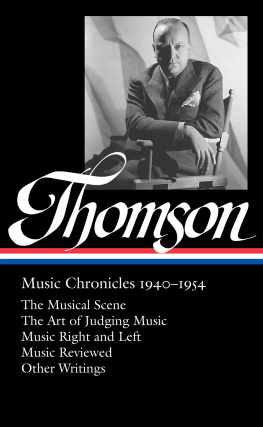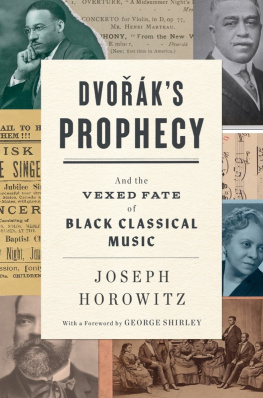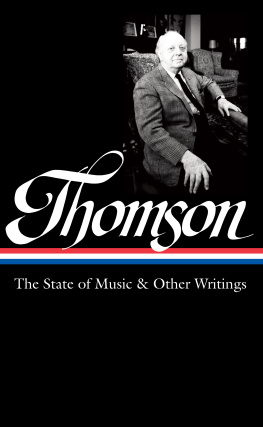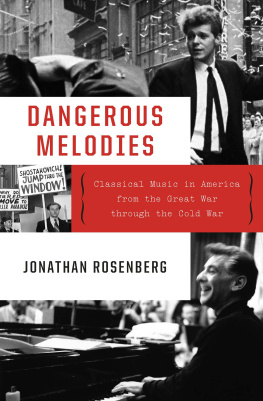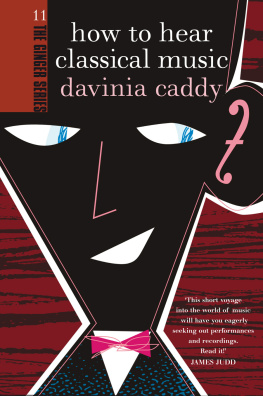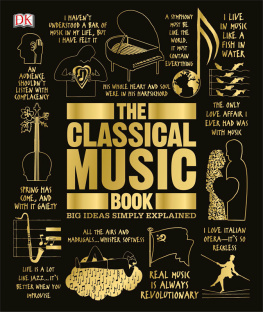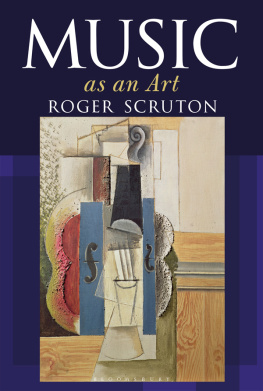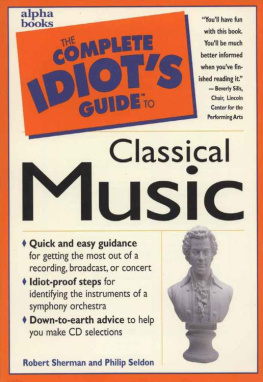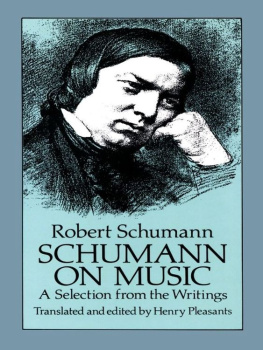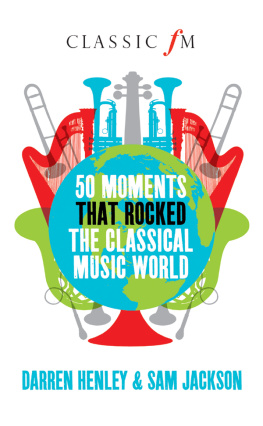
VIRGIL THOMSON
MUSIC CHRONICLES
19401954

The Musical Scene
The Art of Judging Music
Music Right and Left
Music Reviewed 19401954
Other Writings

Tim Page, editor

THE LIBRARY OF AMERICA
VIRGIL THOMSON: MUSIC CHRONICLES 19401954
Volume compilation, notes, and chronology copyright 2014 by Literary Classics of the United States, Inc., New York, N.Y.
All rights reserved.
No part of this book may be reproduced in any manner whatsoever without the permission of the publisher, except in the case of brief quotations embodied in critical articles and reviews.
Published in the United States by Library of America.
Visit our website at www.loa.org
Texts by Virgil Thomson copyright 2014 by Virgil Thomson Foundation, Ltd.
Distributed to the trade in the United States by Penguin Random House Inc. and in Canada by Penguin Random House Canada Ltd.
Library of Congress Control Number: 2013916299
THE LIBRARY OF AMERICA, a nonprofit publisher, is dedicated to publishing, and keeping in print, authoritative editions of America's best and most significant writing. Each year the Library adds new volumes to its collection of essential works by America's foremost novelists, poets, essayists, journalists, and statesmen.
If you would like to request a free catalog and find out more about The Library of America, please visit with your name and address. Include your e-mail address if you would like to receive our occasional newsletter with items of interest to readers of classic American literature and exclusive interviews with Library of America authors and editors (we will never share your e-mail address).
Print ISBN 9781598533095
eISBN 9781598533644

The Library of America 258
Virgil Thomson: Music Chronicles 19401954
is published with support from the
VIRGIL THOMSON FOUNDATION, LTD.
THE MUSICAL SCENE
Introduction
T HE FOLLOWING selected essays and reviews, with one exception, appeared in the New York Herald Tribune between October 11, 1940 and July 23, 1944. They are not offered here as a complete picture of New Yorks musical life during that time but rather as a panoramic (here and there even stereoscopic) view of musical America as that has been visible to an American musician resident in New York. They have been arranged by subjects because they cover too short a period to give chronological order any specific value. They have been chosen in some cases because of what I imagine to be a general interest in the subjects covered, in others because I have wished to give a further circulation to ideas that I hope may be of use to other persons, whether professionals or laymen, whose relation to musical art is not wholly casual.
I hope, further, that in spite of all the diversity of subjects and all the variation that exists in the thoroughness with which these have been treated, a clear attitude has been expressed toward the art and a clear view taken of its place in culture. That view is the result of much reflection on my part and of long practice as a writer of music. If it fails to appear at the end as either consistent or defensible, the book will have failed of its purpose. Certainly I do not feel adequate to summing it up here in a paragraph. But I hope it will communicate itself to the reader as a straightforward and eminently sensible attitude.
This does not mean that I hold my opinions to be all true. I do not. Nor do I consider them to be permanent. I am both submissive to facts and amenable to argument. And I consider my personal biases to be facts, not opinions. I will not even hold, therefore, that these do not carry some weight in the balance of my judgment. But if my opinions are not wholly unbiased, neither are they irresponsible. They are the opinions of a man from Missouri who is also a workman. For all the faults of judgment that may be found in them, I sincerely hope that they will not be considered as frivolously arrived at or too unfairly stated, my aim in this regard having been, as you may well suppose, to inform the reader rather than to protect anybodys career or to help perpetuate any given state of affairs.
Except for a reasonable correction of typographical accidents and grammatical slips, most of the pieces are printed as they originally appeared, though occasionally a more precise word or phrase has been substituted for a hastily chosen one.
I wish to express my thanks to Minna Lederman, editor of Modern Music, for her kind permission to include the article entitled Chaplin Scores.
V. T.
Denville, New Jersey, 1945
Taste in Music
A TASTE for music, a taste for anything, is an ability to consume it with pleasure. Taste in music is preferential consumption, a greater liking for certain kinds of it than for others. A broad taste in music involves the ability to consume with pleasure many kinds of it.
Vast numbers of persons, many of them highly intelligent, derive no pleasure at all from organized sound. An even larger number can take it or leave it alone. They find it agreeable for the most part, stimulating of the sentiments and occasionally interesting to the mind. But music is not for them a passional experience, a transport, an auditory universe. Everybody, however, has some kind of taste in music, even persons with little or no taste for it. No subject, save perhaps the theory of money, is disputed about so constantly in contemporary life as the divers styles of musical expression, both popular and erudite, their nature and likability.
There are often striking contradictions between what musical people admire and what they like. Admiration, being a judgment, is submission to reason. But liking is an inspiration, a datum exigent, unreasonable, and impossible by any act of the will to alter. It will frequently alter itself, however, without warning. And loyalty to things we once loved dearly brings tension into everybodys taste. Persons whose musical experience is limited may, indeed, be more loyal to old likings than persons who deal with music all the time. The latter tend to reject and to accept with vehemence; they are choosy. And their choosiness is quite independent of their judgment; it is personal and profoundly capricious. They can switch from Beethoven to boogie-woogie, from Bach to barbershop, with a facility that is possible only to those who take all music for their clothes closet. For practical living, man needs to be free in his thought and responsible in his actions. But in dealing with art, responsibility of thought, which makes for slowness of judgment, and freedom of action, which makes for flexibility of taste, constitute the mechanics of vigor.
The development of taste is not a major objective in musical education. What the young need is understanding, that whole paraphernalia of analysis and synthesis whereby a piece is broken up into its component details, mastered, restored to integrity, and possessed. Musical understanding depends not so much on the number of works one has learned in this fashion, provided examples from several schools have been included, as on the completeness with which the procedure has been carried out. Any student can be convinced by study that Mozart is a more accomplished workman than Grieg or Rachmaninoff. If he still likes Grieg and Rachmaninoff better, that is his privilege. Maturity is certain to alter, whatever they may be, his youthful predilections.
Next page
